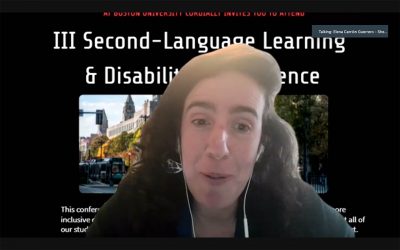Learning a second language is a staple of Boston University’s College of Arts and Sciences experience — and a requirement for any CAS major. But with such a policy comes a responsibility and commitment to inclusivity and accessibility.

BU’s Department of Romance Studies held their third-annual Second-Language Learning and Disabilities Conference over Zoom this weekend.
Keynote speaker Elizabeth Hamilton is the associate dean of Oberlin College’s College of Arts and Sciences as well as an associate professor of German language and literature. She said at the event the goal of the conference was to discuss how language teachers can build a more inclusive environment for students despite barriers in language or disabilities, especially during remote learning.
“My hope is that this afternoon’s meeting and tomorrow’s presentations will serve to increase our knowledge and our skills,” Hamilton said, “and perhaps just as importantly, take an inventory of how far we have come as language professionals in order to nourish us for the work ahead.”
The two-day conference was held over Zoom Friday afternoon and all day Saturday.
In her keynote, Hamilton primarily focused on inclusivity in language learning and how tolerance, acceptance and anti-racism play an increasingly important role in academic subjects.
“We, the very broad we, who teach language and support higher education learned in no uncertain terms that we can no longer refer to access and inclusion in terms of special needs,” Hamilton said. “Accessible and anti-racist design are conscientious interventions into historically narrow systems and structures of education.”
Other event organizers and speakers included Elena Carrión-Guerrero, a Spanish lecturer at BU. She said in an interview there is a greater effort in creating an all-inclusive environment for educators and students alike.
“We wanted to give educators the tools on how to leverage that in the classroom and usually we use a universal design approach,” Carrion-Guerrero said. “Those accommodations are for everybody. Everybody’s going to have access to learn, so everybody’s included.”
María Datel, a senior Spanish lecturer who also organized and spoke at the event, said one purpose of the conference was to learn about the challenges students with disabilities face in the classroom to better accommodate them.
“The idea is basically to learn about different learning disabilities that affect or interferes with language learning,” Datel said in an interview. “If we learn about those, we can improve our programs to accommodate people with disabilities.”
Datel said it’s important to make language programs at BU more accessible for students with learning disabilities and all underrepresented identities in the classroom.
“The way we think about this is through the lens of social justice,” Datel said. “If we want to tackle oppression, we need to consider all kind of oppression.”
Lorre Wolf, director of BU Disability and Access Services, said despite prior stereotypes, non-neurotypical students are just as capable as anyone else when it comes to learning a foreign language.
“There is no disability which uniquely affects someone’s ability to learn a foreign language or a second language,” Wolf said in an interview, “but they may need to be taught differently.”
She said BU faculty members divided “wonderful, flexible inclusive ways” to make the CAS foreign language requirement work for everyone, which she spoke about at the event Saturday.
Wolf said this year’s conference expanded to include topics such as language culture and American Sign Language.
Guest speaker Wade Edwards, a professor of French and associate dean of the Cook-Cole College of Arts and Sciences at Longwood University, spoke at the event about how to follow through on commitments to diversity and inclusion and ways faculty can support students.
In an interview, Edwards shared his research which he said further supports the need for increased disability services at colleges and universities.
“The most concerning data that we found was that students with disabilities withdrew from the class at a much higher rate than students who didn’t have a disability,” Edwards said. “Since that foreign language requirement is a graduation requirement, that also meant that the students’ disabilities took longer to get through the requirement, if they got through it at all.”
He said professional developments guiding instructors helped better support students.
Tim Riker, an ASL and deaf studies instructor at Brown University who spoke at the event, said online learning has increased people’s access to education in general.
“With Zoom, there are various opportunities that we can take advantage of,” he said, “and using Zoom as a tool to be more inclusive and to garner more activity from those students and trying to adapt activities.”
BU students also agree with the importance of fostering more inclusivity through second language-learning.
CAS freshman Sam Almond said he is taking Spanish this semester, and language-learning is significant both in university studies and working environments.
“It sets you up for a lot more opportunities that you wouldn’t have normally if you spoke just one language,” Almond said. “It will really help you in the future, even if you’re just traveling or if you’re traveling for work. It’s a really good skill to have.”

























































































































María Datel • Mar 1, 2021 at 12:16 pm
Thank you for covering the event, Connor & FreePress
Viva la inclusión!!